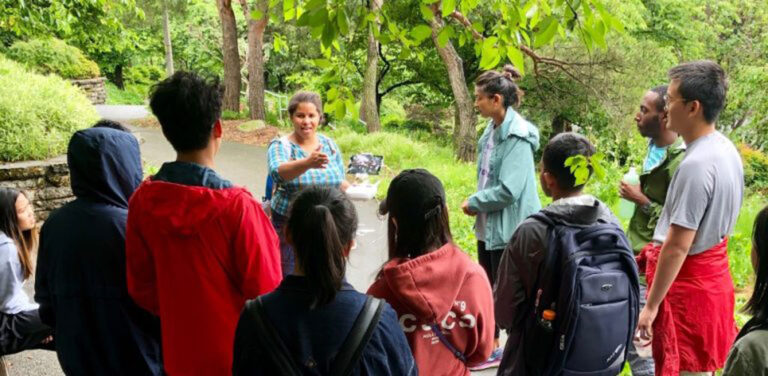Advocate for Geography in Austerity – Part 2
 This is Part 2 of a two-part column on what geography departments can do (and should not do) to advocate for their work in budget talks, which are all the more crucial during the COVID-19 pandemic. These points are largely derived from answers I received from geographers in upper administrative positions at universities.
This is Part 2 of a two-part column on what geography departments can do (and should not do) to advocate for their work in budget talks, which are all the more crucial during the COVID-19 pandemic. These points are largely derived from answers I received from geographers in upper administrative positions at universities.
As I noted in my last column, I receive many requests about what the AAG can do to help departments demonstrate their relevancy to key stakeholders and avoid losing positions or being out on the chopping block. I therefore sought input from an expert group of key stakeholders – geographers who are upper-level college and university administrators. My request was fairly simple: “From the perspective of a dean or provost, please list your ‘Top 3 Dos’ and ‘Top 3 Do Nots’ in order to be a highly effective, impactful, and well-functioning geography department.”
Last month, I focused on what Geography Departments should not do. This month, I summarize some of the strategies departments should pursue to remain relevant to students, the public, and university and college administration.
- Do… Align Strategies with Institution Priorities. Most, if not all, colleges and universities have published institutional visions. Long-term, sustained goals often revolve around increasing the university’s ranking, increasing undergraduate enrollment, bolstering external research funding, expanding extension, and/or improving student success. Shorter-term initiatives and/or goals often focus on hiring initiatives around key topical interests. For example, a quick web search revealed many university Data Science Initiatives (U Oregon, Harvard, U Michigan, Brown, Northwestern, Rice, Stanford, Purdue,…). And almost every university in the nation is scrambling to increase the diversity of its faculty. At the University of Oregon, the Institutional Hiring Plan (i.e. the process by which departments submit faculty hiring requests) explicitly references institutional hiring initiatives and requires departments to identify positions that align with those priorities. Clearly, aligning faculty and department priorities, goals, activities, and—when reasonable—faculty requests to these priorities is strategic.
As summarized by one of the administrators providing responses to my query:
“So, if a university has as its aim the increase in externally funded research, then the geography department must contribute. If, as is the case for a place like […] College, the goal is student majors and student satisfaction, then concentrate on that. If the university is trying to advance its international image, then geographers should participate in international collaborations with partner universities, teach synchronous or asynchronous courses with international partners, etc. In other words, whatever the strategic plan of the university it, the geography department, needs to track how it can and does contribute.”
As I mentioned last month, administrators don’t necessarily know (or care) about all of the trajectories within disciplines. They’re concerned about the health, mission, vision, and initiatives of the entire institution. And, they’re the ones who allocate faculty lines. Aligning departmental priorities with institutional priorities is not only strategic in the short term (i.e. getting the faculty lines, extra space, or other resources); it’s also strategic in the long term to position the department and new faculty as partners in helping the university achieve its goals.
- Do… Listen and Communicate Effectively and Respectfully. I am constantly working on how to be a better communicator. I mostly don’t talk much, unless my role requires it. I’ve always felt that I learn more by listening than I do by talking. But, being a good listener also means being a good discourser (much to my displeasure). Check out this posting (thank you Kavita Pandit for sharing this), which contains some excellent tips for developing listening skills.
Effective communication is important both within the department and with administration. A small section of a single column is completely inadequate to discuss effective communication. As a brief summary, some strategies departments/organizations as well as all faculty can deploy (or avoid) include:
- Avoid the seductive lure of callout. Faculty members will likely not always agree with administrators’ (or others’) decisions, especially around goals and resource allocation. But…Callouts are one-way screeds that, by design, don’t allow for productive conversation. Much has been written about the callout-culture. One of the most eloquent voices is Loretta Ross (I am anxiously awaiting the publication of her forthcoming book, Calling In the Calling Out Culture: Detoxing Our Movement). Callouts do provide the potential to have your voice and opinion heard and gather allies from around campus. But, if the goal is to advocate for your department, students, faculty, staff, or change decisions and behaviors, a respectful two-way conversation is usually a more effective approach.
Even in this fractious time we find ourselves, I remain hopeful that academics will continue to commit to a culture that is informed, deliberative in judgement, charitable in spirit, and open to debate. And to achieve that…
- Do disseminate relevant information to your colleagues. There are few things that are more frustrating to faculty than not knowing about upcoming deadlines, initiatives, institutional priorities, or opportunities.
- Do brag about your faculty’s accomplishments. Regularly share with your Dean the achievements in your department (faculty, students, and staff). In that same vein, also support/nominate department members for university and external awards.
- Do present a unified front in supporting department decisions, whether they’re made by vote or consensus. Obviously, not everyone is going to always agree with group decisions. While complaining is sometimes cathartic, there is little (if any) strategic benefit in airing dirty laundry in public. Assuming that it’s done through a respectful and democratic process within departments, respecting rather than undercutting the process of decision-making preserves collaboration.
Remember; today’s adversary is tomorrow’s ally.
- Do… Be Central to Institutional Partnerships. Participate actively in the initiatives, goals, interdisciplinary education, and research of the college or university. As one of my senior colleagues said to me many years ago, don’t underestimate the importance of being a good department, college, and university citizen. I would add disciplinary citizenship. Good citizenship is especially helpful in the face of slides in metrics (i.e. declines in enrollments, majors, research productivity…). As one of the deans responding to my request said: “Building a quality faculty that is willing to roll up sleeves and help the college overall is very much appreciated…”
Serving on college/university-wide committees allows geographers to highlight the accomplishments of our colleagues, show the value of our discipline, and foster diplomatic relations with other units. It also provides a gateway to information, allowing departments to stay ahead of changes in the institution as well as identify upcoming initiatives, goals, or priorities.
- Do…Be Productive. Nearly all of the responses I received from administrators identified metrics as one of the most important criteria for faculty and departments to pursue. Some metrics are specific to an institution, but many are similar across institutions. As one geography administrator said, “Deans of most large research universities use metrics. This is partly because the provost/president also demand performance measured in terms of student credit hours produced, numbers of majors, amount of external grant funding awarded, and recognition of the scholarship of the faculty.”
Metrics are central to relevancy. The savvy and successful faculty and departments understand the metrics by which their institutions evaluate them. One of my respondents put this very succinctly: “Set high expectations for department faculty members and enforce high standards. Departments that attempt to promote individuals who do not meet the standards of the university (or college) bring negative attention to the unit. On the other hand, when departments promote very high functioning individuals, the entire department is viewed more positively.”
There are many more “Dos,” just as there were many more “Don’ts” that could have been listed in last month’s column. But this list does highlight the major themes raised across the administrator I queried and provides a good starting point for advocating for geography.
Thank you very much to the experts who responded to my request and provided valuable input: Duane Nellis, Risa Palm, Kavita Pandit, JP Jones, Diana Liverman, W. Andrew Marcus, Alec Murphy, and Bob McMaster.
The dual crisis facing academia that I introduced in last month’s column is concerning at the very least. But, this also could be a great time for strengthening the impact, if not the resolve, of geographers and geography. I believe that this is not so much an opportunity as it is a necessity. We need to make sure that we’re ready to continue leading in all of the issues facing our planet and its inhabitants.
Live long and prosper Geography.
—Amy Lobben
AAG President and Professor at University of Oregon
lobben [at] uoregon [dot] edu
DOI: 10.14433/2017.0083
Please note: The ideas expressed in the AAG President’s column are not necessarily the views of the AAG as a whole. This column is traditionally a space in which the president may talk about their views or focus during their tenure as president of AAG, or spotlight their areas of professional work. Please feel free to email the president directly at lobben [at] uoregon [dot] edu to enable a constructive discussion.


